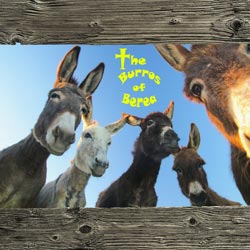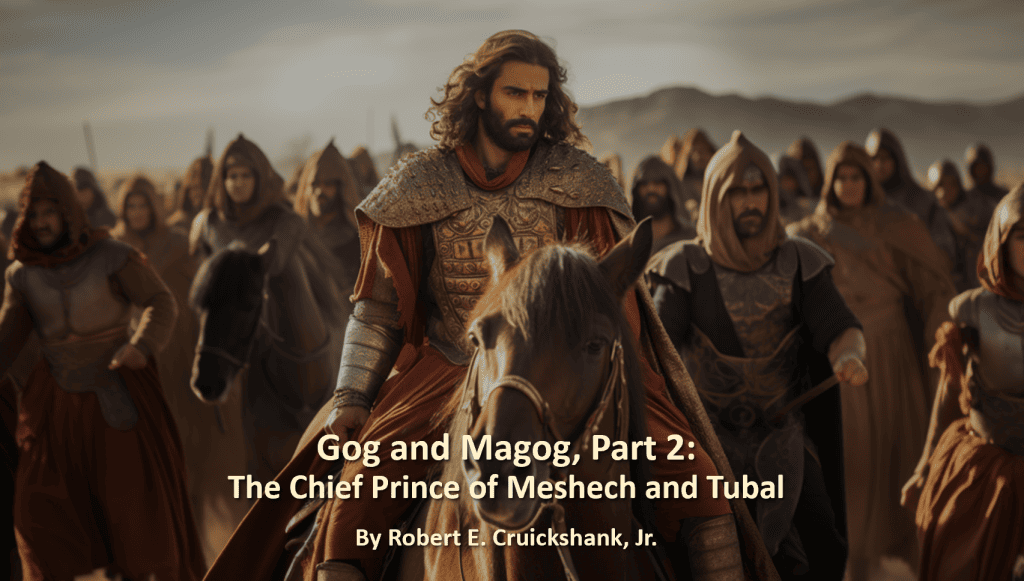Gog and Magog, Part 2: The Chief Prince of Meshech and Tubal
Copyright © Robert E. Cruickshank, Jr. (January 11, 2024)
Jelene Gouty (Editor)
Brett Prieto (Proofreader)
All Rights Reserved
“Now the word of the Lord came to me, saying, ‘Son of man, set your face toward Gog of the land of Magog, the chief prince of Meshech and Tubal, and prophesy against him, and say, ‘This is what the Lord God says: ‘Behold, I am against you, Gog, chief prince of Meshech and Tubal’” (Ezekiel 38:2).
In the previous article, we saw that Haman the Agagite from the book of Esther fits the bill as Gog of the land of Magog from the book of Ezekiel.[1] This second article will focus on how this connection is reinforced by Ezekiel’s description of Gog as the “chief prince of Meshech and Tubal,” coinciding perfectly with Haman’s status in the Persian Empire at the time of Esther.
Having said that, anyone who is familiar with today’s pop-prophecy pundits knows that they see things differently. For them, this passage has nothing to do with ancient Persia and everything to do with modern Russia. For example, David Jeremiah states, “Approximately 2,500 years ago Ezekiel predicted specific events that will occur in Russia’s future.”[2] This completely removes the passage from having any relevancy to Ezekiel’s own time or his original audience. Nonetheless, for the prophecy sensationalists, Ezekiel 38 and 39 is all about “Russia, Russia, Russia.”[3]
Hooked on Pop-Prophecy Phonics
It is specifically Ezekiel’s reference to Gog as the “chief prince” that allows Jeremiah and others to make the Russian connection. The word translated “chief” is the Hebrew word Rosh (רֹאשׁ), and according to Jeremiah: “…the reference to Rosh in verse 2 is a shortened version of the word Russia.”[4] In a nutshell, the argument is that “Rosh” is a reference to “Russia” because these words sound alike.[5]
Popular as this approach may be, phonetic similarity between languages is no way to go about interpreting the Bible. As Michael Heiser says,
“Ah Rosh…Russia. There we go! That’s about all the thought that went into it. It is not a view that is based on primary source material or even coherent thought. Show me someone who does exegesis by matching sounds between languages and then saying the words mean the same thing, and I’ll show you someone who doesn’t understand either exegesis or languages at all. There’s just no merit to this approach. It’s utterly absurd. It’s nonsense.”[6]
It’s nonsense, indeed. For example, “chin,” in Chinese, means “gold, metal, money – something bright.” In English, “chin” refers to the lower portion of the human face. “Kol,” in Hebrew, means “all, every, or the sum total of the whole.” In English, a piece of coal is a black lump of rock. In Aramaic, we can say, “Simon bar Jonah.” This doesn’t mean Simon went to a drinking establishment named “Jonah’s.” It means Simon was the son of Jonah.
And to top it off, Rosh in this sentence isn’t even functioning as a noun, much less a place. It’s functioning as an adjective, and the word means “chief,” “head,” “beginning,” or “source.” It modifies the noun “prince,” hence: “chief prince.”
To quote Heiser one more time on this: “It is not being used as a noun to name a place that didn’t even exist at the time. There is no such place name in any ancient text. There is no place name Rosh known in the entire ancient world. Period. It’s not a place name.”[7]
Rosh, Rus, Russia
Gerald Flurry tries to get around this by saying, “Rosh was the ancient name of Russia, once called Rus.”[8] He then says he can’t think of “any other politician” or “anyone else on the horizon” who fits the specifics of Ezekiel’s prophecy other than Vladimir Putin. Looping in Revelation 9:16, Flurry then says, “I strongly believe Vladimir Putin is going to lead the 200 million-man army. Just look at the power he already has.”[9] All of this is based on Russia’s ancient identification as Rus.
While it is true that Russia was once called Rus, the problem is that Rus is a word introduced by the Vikings in the Middle Ages and not by Hebrews at the time of Ezekiel.[10] Ezekiel’s audience would have been as unfamiliar with the word Rus as they would have been with Russia.
The bottom line: “Rosh” is a common Hebrew word used hundreds of times in the Old Testament, meaning: “chief,” “head,” “beginning,” or “source.”[11] Again, the word functions as an adjective and not a noun and or a place. The Jews still use it this way today. For example, “Rosh Hashanah marks the beginning of the Jewish New Year.”[12] Benjamin Netanyahu’s title in Hebrew is Rosh HaMemshala, literally: “head of the government.”[13] So, “Rosh” is not “Russia,” and all that Ezekiel 38:2 means is simply that Gog is being identified as the “chief prince” of Meshech and Tubal – two place/people names from the Table of nations, which had both become part of the growing Persian Empire by the time Ezekiel wrote.[14]
Haman the Chief Prince
And this fits the profile of Israel’s enemy Haman, in the book of Esther, precisely. As Josh Peterson writes: “Ezekiel 38:2 refers to Gog as ‘the chief prince.’ This means Gog is not the actual king of an empire or kingdom, but rather is a high-ranking official. This is a fitting description for Haman, who was not the king of Persia, but rather was a high-ranking official.”[15]
And the book of Esther bears this out:
“After these events, King Ahasuerus promoted Haman, the Agagite, and advanced him and established his authority over all the princes who were with him” (Esther 3:1-2).
“Then Haman recounted the glory of his riches, and the number of his sons, and every instance where the king had magnified him, and how he had promoted him above all the princes and servants of the king” (Esther 5:12).
If Haman was “over all the princes” and “above all the princes,” in the Persian Empire, then he was in fact the “chief prince,”[16] and this matches Ezekiel’s description of Gog perfectly.
The Past and The Future
Rather than looking 2500 years into the future from Ezekiel’s time, the prophecy was fulfilled within 60 years.[17] It corresponds to events that would directly affect Ezekiel’s readers and their immediate descendants. When the Babylonian exile was over and Israel became part of the Persian Empire, they would face another battle – a battle led by the “chief prince” of that empire.
In our next installment, we’ll take a look at verses 4-6 and the fact that Ezekiel is very much describing an ancient battle fought with ancient weapons. This again pulls us to the distant past, rather than our near future, to find the prophecy’s fulfillment.
___________________________________________________
[1] https://burrosofberea.com/gog-and-magog-part-1-from-saul-and-agag-to-mordecai-and-haman/
[2] https://www.davidjeremiah.org/age-of-signs/what-does-the-bible-say-about-modern-russia?devdate=2020-04-03
[3] This seemed like a good place to echo Donald Trump responding to his critics – couldn’t resist! https://www.facebook.com/WhiteHouse45/videos/president-trump-russia-russia-russia/213918896398195/
[4] Ibid.
[5] Andy Woods tries to dispute this as the sole reason, claiming the LXX takes Rosh as a place name https://www.youtube.com/watch?v=xwFGuLggW7c. But, here is the passage in Benton’s translation: “And the word of the Lord came to me, saying, 2Son of man, set thy face against Gog, and the land of Magog, Rhos, prince of Mesoch and Thobel, and prophesy against him, 3and say to him, Thus saith the Lord God; Behold, I am against thee, Rhos prince of Mesoch and Thobel.” https://biblehub.com/sep/ezekiel/38.htm
[6] Naked Bible Transcript, Episode 152, p. 12 https://nakedbiblepodcast.com/wp-content/uploads/2017/04/NB-152-Transcript.pdf
[7] Naked Bible Transcript, Episode 152, p. 10 https://nakedbiblepodcast.com/wp-content/uploads/2017/04/NB-152-Transcript.pdf
[8] https://www.thetrumpet.com/11228-is-vladimir-putin-the-prophesied-prince-of-rosh
[9] Ibid.
[10] Edwin M. Yamauchi, Foes from the Northern Frontier: Invading Hordes from the Russian Steppes (Grand Rapids, MI: Baker Book House, 1982), p. 20.
[11] Gary Demar, The Gog and Magog End Time Alliance (Powder Springs, GA: American Vision, 2016), p. 82.
[12] DeMar, Ibid.
[13] https://en.wikipedia.org/wiki/Prime_Minister_of_Israel
[14] “Meshech and Tubal were areas of the Persian empire of Asia Minor and the northern Pontus and southern coasts of the Black Sea.” https://shreddingtheveil.org/2020/03/29/ezekiel-in-revelation-part-vi-the-land-of-gog/
[15] Difficult Passage: Ezekiel 38, Part 2 – Providence Christian Church (providencechristiannm.com)
[16] The word in Esther is שַׂר (sar) ‘ruler’ (H8269); whereas, the word in Ezekiel is נָשִׂיא (na.si) ‘leader’ (H5387a). But the difference is inconsequential in that both words retain the same, basic meaning. This is merely a matter of preferred word choice among two separate authors.
[17] William Cox dates Ezekiel’s prophetic ministry from 592-570 BC (Biblical Studies in Final Things [Phillipsburg, NJ: Presbyterian and Reformed Publishing Co., 1966] p. 62). James B. Jordan and Phillp Kayser date the battle in Esther at 510 BC, see: https://biblicalblueprints.com/Sermons/BibleSurvey/14%20Esther?utm_source=kaysercommentary.com
https://www.biblicalhorizons.com/biblical-chronology/8_03/
Jordan, James B.. Darius, Artaxerxes, and Ahasuerus in the Bible (p. 73). Athansius Press. Kindle Edition.


